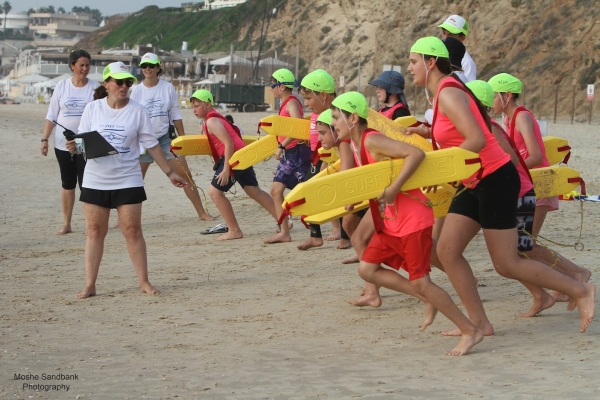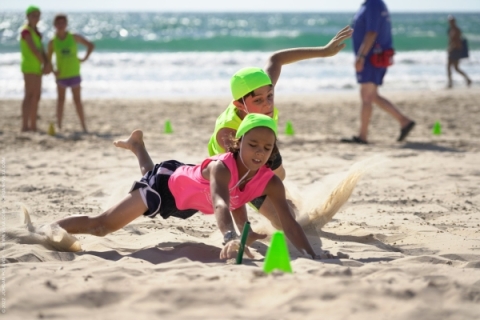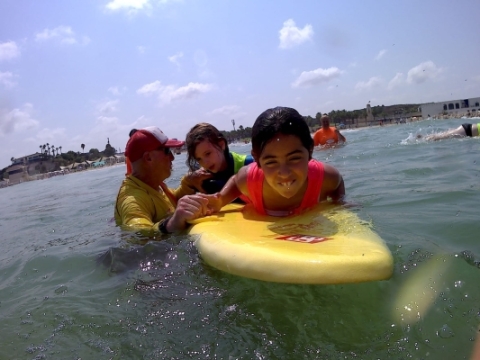How to Prevent Drowning
Israel has a drowning epidemic. Every summer, dozens of people drown or nearly drown at beaches around Israel, yet there is no national program for teaching drowning prevention, and even learning to swim in the parched country is prohibitively expensive for large swaths of the population.
In a bid to address this challenge, three veteran Australian immigrants ‒ brothers Paul and Danny Hakim, and Lisa Segelov ‒ founded the Israel Life Saving Federation (ILSF) in 2019. The ILSF is the local member of the International Life Saving Federation, a broad international movement dedicated to water safety and civilian lifesaving and rescue. The movement is based on the Australian model for water safety, considered the global leader in the field. Its main focuses include classes on surf awareness, water safety and rescue for youth and children, and training a civilian team of beach patrol volunteers who are taught to extract drowning people from the oceans and offer first aid.
"Teaching drowning prevention and water safety is standard overseas. It's taught in schools and also in informal education. It's proven to reduce youth drownings," says ILSF CEO Paul Hakim. "Israel has a challenge on that front because we're such a multicultural society. Basically everyone goes to the beach, but because of our community makeup and economic situation, not everyone is equipped or knowledgeable to conduct themselves safely at the beach."
The vast majority of beach drownings in Israel's summer bathing season occur either on official beaches during hours when the lifeguards are not on duty, or on unofficial beaches where lifeguards do not patrol and swimming is ostensibly forbidden.
"Many of these deaths could be prevented if only Israel would adopt Australia's culture of water safety," says Hakim. "In Australia, that culture starts from the age of four. Children learn basic water safety in preschool, and go on to learn how to offer drowning first aid. It's part of being a water-safe community."
In its three years of operations, the ILSF has run dozens of classes for hundreds of children and teens, programs known in the international movement as the Nippers and the Dolphins, respectively. The youngest Israeli participants, elementary pupils from age seven, learn to swim into and out of breaking waves, ride a surfboard on their own and with a partner, carry out simulated ocean rescues, and study basic surf awareness, such as where it's safe to swim and how to recognize rip tides. Teen participants, on the other hand, finish the program capable of rescuing adult drowning victims. Many have gone on to do so.
The ILSF has found a receptive ear to the movement's water safety model in the halls of government, including in the Knesset. The ILSF is campaigning to lower the average age at which children learn to swim in Israel to six years old ‒ currently it's closer to 12 ‒ and to institute a national program of surf awareness education. It envisions high school students patrolling beaches in cooperation with local lifeguards as part of community service programs, much as is done in Australia and other countries.
The ILSF's water safety volunteers, who either completed the NGO's certification course in Israel or come with their own foreign certifications, help operate classes for children and adults. They also volunteer on the safety staff at major international swimming events in Israel, including Israel's first-ever Ironman competition held in Tiberias last year, and an Olympic marathon swimming qualifying event in Eilat. The group's volunteers pride themselves in generally reaching people before they are in deep distress ‒ preventing not only drowning but trauma. Many of the volunteers are immigrants from various English-speaking countries with strong water safety cultures.
Classes have been held in both Jewish and Arab communities; the Arab sector generally faces a higher drowning risk per capita, due to factors such as poverty and education. One of the ILSF's most meaningful partnerships in this regard is with Mohammed and Hamama (Gamel) Gorban, siblings who run the Surfing 4 Peace surf school in Jisr al-Zarqa, the Arab community's first and only surf school. Together, the ILSF and the Gorbans have taught water safety courses for dozens of children and teens in this disadvantaged Arab town on the Mediterranean coast.
"When it comes to drowning, there's no difference between Arabs and Jews. We all need to protect each other," says Hamama Gorban. "It's important for everyone who lives on the beach, who comes to the beach, who loves the ocean. Knowledge is important."
She stresses the movement's importance in forming bonds. "It builds love between the two sides ‒ we're looking out for each other and saving lives on land and in the sea."
As part of a broad international movement, the ILSF has taken advantage of the Abraham Accords to build and strengthen partnerships that until recently wouldn't have been possible. The ILSF signed a memorandum of understanding with the United Arab Emirates' Viking Surf Sports during a ceremony in Dubai in March, and then with the Royal Moroccan Lifesaving Federation on the Maccabiah stage in Israel in July 2022.
As part of the partnership, senior representatives of the Royal Moroccan Lifesaving Federation came to Israel to lead an international lifesaving certification class for Israeli volunteers. The instructors led the class in English and Arabic, while participants spoke Hebrew among themselves.
The ILSF seeks to promote surf lifesaving in Israel as a competitive sport as well as a movement. Surf lifesaving competitions were held at the Maccabiah for the first time this year, hosted by the ISLF and staffed by top international judges. Adult and child participants came from around the world to take part in the surf lifesaving carnival on Netanya's Poleg beach in July, racing in the sand and sprinting and surfing through the waves. The Moroccan delegation attended as well.
"We're using lifesaving as a medium for peace," says Hakim. "We've joined forces to collaborate with the UAE and Morocco to run more water safety courses for children. As well as saving lives, it's definitely breaking down cultural barriers."
Water Safety Tips
The most important piece of advice when it comes to drowning prevention is that knowing how to swim won't necessarily protect you from drowning ‒ certainly not in the ocean. The ocean is a dynamic place, and ocean currents can be more powerful than even the strongest swimmer.
The primary rule for keeping safe is to swim at an official, recognized beach when lifeguards are on duty. Lifeguards regularly test the waters and use a flag system to mark which parts of the beach may have dangerous currents ‒ a situation that could change over the course of the day.
Swimming at times when lifeguards are off duty, and certainly in the dark or while inebriated, all increase your chances of drowning.
If you observe a calm spot between the waves, in all likelihood that's the rip tide ‒ and contrary to first appearances, it's not a safe spot to swim.
If you do find yourself caught in a rip tide, the most important thing to do is to stay calm and don't fight the ocean. It won't pull you under the water, only out to sea. Float on your back to preserve your strength, wave to someone on the shore for help, and try to exit the rip by swimming parallel to the beach ‒ not against the current. Eventually the rip will end, and you'll be able to swim back to the beach at an angle.
And finally, it's important to know that people who try to save others who are drowning often wind up drowning themselves ‒ often because the drowning person, in their panic to stay alive, will grab them and prevent them from swimming. If you see someone in trouble, the most important thing is to call for help. Before trying to rescue them, evaluate whether you have the skills to do so. Trained lifesavers almost never try to rescue someone without a floatation device.
Liz Steinberg is an Israel Life Saving Federation volunteer.










Comments